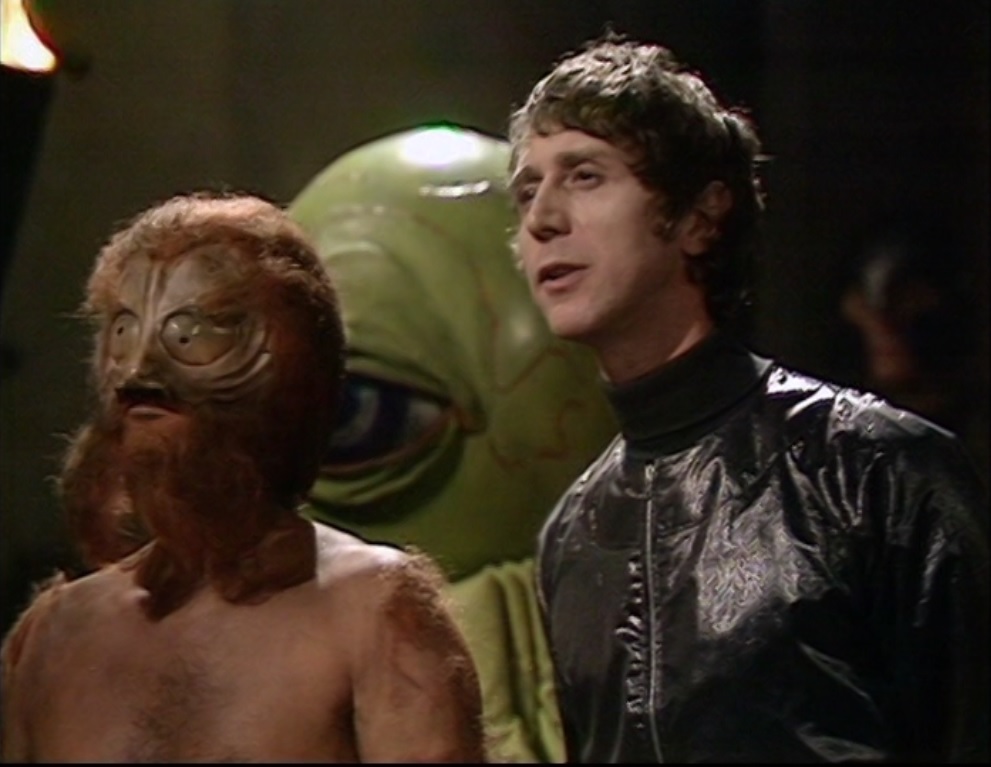
|
Eckersley |
Reviews

|
Eckersley |
A Flawed Villain? by Tim McCree 29/6/20
Not too long ago, I wrote a Fan Fiction called Riverworld Who Style (which is available at FanFiction.net if anyone is curious and wants to read it) in which I revisited the character of Eckersley, from The Monster of Peladon (and since the writer of Monster, Brian Hayles, never bothered to, I gave Eckersley a first name: Garth).
Played by Donald Gee, Eckersley initially came across as a decent chap. Sure, he seemed indifferent at times to the current situation on Peladon, but, at one point, he explained that getting involved in local politics was off limits to Federation personnel (kind of their own version of Star Trek's Prime Directive). He was there to mine trisilicate, nothing more.
When the Doctor and Sarah Jane arrive, Eckersley got on well with both of them, particularly Sarah Jane (I know that the initial idea was for them to be romantically involved, but that got dropped). There were several scenes in which Eckersley really seemed to like Sarah Jane, and it looked like the two of them were on the way to becoming friends.
Then we get to Episode Four and it's revealed that Eckersley was a traitor and working for Galaxy Five the whole time. WTF!?
Now, is it just me, or did it seem that the whole 'Eckersley is a traitor' thing seem tacked on? It's like Brian Hayles was thinking "Bloody hell, it's only Episode Four, and I'm out of story. But I have two more episodes to do. I know, I'll make Eckersley a villain, even though there is has been no indication of him being such. Yeah, that'll work!"
The problem is that it doesn't work, at least not to me. I'm sorry, but no one is going to convince me that Eckersley's friendship with Sarah Jane was all just an act. If it is, then Eckersley should be nominated for an Oscar. However, as I said, I am not convinced.
Certainly, Eckersley's own actions seem to support my theory. At one point, Sarah Jane had him at blaster point in the communications room. Of course, Eckersley got the jump on Sarah Jane and disarmed her. Eckersley then stated that she and the Doctor ruined his plan. One could be forgiven to think that he would shoot her dead at that point. However, he didn't. He ordered Sarah Jane to turn around, and, when she did, he took off, locking her in the room.
And when he was using the refinery alarm on the Doctor, Eckersley was trying to talk the Doctor down the whole time. Eckersley promised that if the Doctor would stop interfering, he would have no problem with letting both him and Sarah Jane go. And, you know what, I believe Eckersley was being sincere in that promise. The only reason Eckersley took the actions he did against the Doctor and Sarah Jane was that they were an impediment to his plans. He bore no hatred or malice against either of them.
Now, Eckersley had no qualms about killing. He did it throughout the story. However, he really seemed to want Sarah Jane and the Doctor to live. I think the reason is that he'd gotten to know both of them and considers them friends. And you don't want to kill, or have someone else kill, someone you've gotten to know as a friend.
At the end, when Eckersley kidnapped Queen Thalira, it was not for the evil; rather he felt that she could guarantee him safe passage off Peladon. One has every reason to believe that, had Eckersley been able to make it to his space ship, he would have let Thalira go.
So, what's going on here?
What I think is that Eckersley was the victim of padding (a common problem of the Pertwee Era). We had a four-part story that was stretched to six, so Brian Hayles had to find a way to pad things out. And the only way to do that was to make Eckersley a bad guy, despite his previous actions. Of course, that led to the issues above.
I honestly believe that, had Monster been permitted to end at Episode Four (as it really should have done), Eckersley would have gotten a much better ending for his character than what he got. The whole traitor thing would most likely have never happened. Bear in mind that this is just my personal opinion on the matter. However, as I have presented, there is evidence to support it. We'll probably never really know, of course.